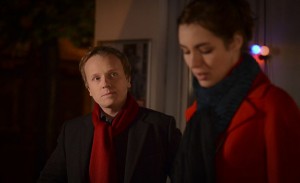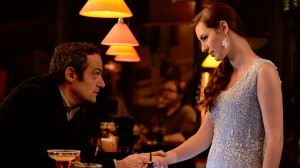 Axelle Ropert’s Tirez la langue, mademoiselle is a beautifully told intimate, emotional and compelling story, which recalls the emotional power of Truffaut’s work. Starring Cédric Kahn & Laurent Stocker as two brothers who are the complete opposites of each other; whilst both are doctors Boris (Kahn) is short tempered and Dimitri (Stocker) is warm and kind, both brothers find themselves falling in love with the same mysterious woman, Judith (Louise Bourgoin), whose daughter the doctors are treating.
Axelle Ropert’s Tirez la langue, mademoiselle is a beautifully told intimate, emotional and compelling story, which recalls the emotional power of Truffaut’s work. Starring Cédric Kahn & Laurent Stocker as two brothers who are the complete opposites of each other; whilst both are doctors Boris (Kahn) is short tempered and Dimitri (Stocker) is warm and kind, both brothers find themselves falling in love with the same mysterious woman, Judith (Louise Bourgoin), whose daughter the doctors are treating.
The structure of the film is very clearly split into three acts; the first follows the brothers in their day to day lives both together and apart. This introduces the audience to the various aspects of their characters and what they are ultimately missing from their own lives. Dimitri is a recovering alcoholic and the audience visit his sombre AA meetings to see him grasp at what he thinks he needs whilst Boris finds himself in the aimless, mundane routine of his day to day life without someone else to be with him along the way. There are also some great sequences of the pair in surgery with different patients; from the pair who want to try and miss school by pretending to be unwell to the teenage boy who wants to come off his epilepsy medication so that he can get an erection for his girlfriend. These incidents really allow the audience to burrow deep into the psyche of the pair and understand their own personal motivations.
During the second act of the film, the brothers themselves infatuated with Judith. They first encounter her after they start treating her daughter, Alice (Paula Denis) for diabetes. The mother and young daughter live alone in a high rise apartment and during the night, Judith must go out and work in a local bar, leaving her daughter alone. On one evening when Alice doesn’t feel well the pair of doctors go over to visit her and this is where they learn of the situation. When Boris goes to visit Judith at her flat during the next day, he doesn’t know what to expect and initially gets on the wrong side of her when he suggests some parenting tips about leaving Alice alone. This offends Judith and he leaves. It is only on subsequent nights when Boris meets Judith from work and takes her out for a meal that he realises she could represent that, which has been missing in his life. The film does appear to tip the scales in one direction more than the other though because Dimitri’s time with Judith is much more limited, but just as emotionally compelling. Whilst she is trying to understand Boris’ attitude, Dimitri realises that what he needs in life is stability and a lack of excitement, something that could lead him back to alcoholism, so Judith and Alice represent a safety net to him.
Alice (Paula Denis) for diabetes. The mother and young daughter live alone in a high rise apartment and during the night, Judith must go out and work in a local bar, leaving her daughter alone. On one evening when Alice doesn’t feel well the pair of doctors go over to visit her and this is where they learn of the situation. When Boris goes to visit Judith at her flat during the next day, he doesn’t know what to expect and initially gets on the wrong side of her when he suggests some parenting tips about leaving Alice alone. This offends Judith and he leaves. It is only on subsequent nights when Boris meets Judith from work and takes her out for a meal that he realises she could represent that, which has been missing in his life. The film does appear to tip the scales in one direction more than the other though because Dimitri’s time with Judith is much more limited, but just as emotionally compelling. Whilst she is trying to understand Boris’ attitude, Dimitri realises that what he needs in life is stability and a lack of excitement, something that could lead him back to alcoholism, so Judith and Alice represent a safety net to him.
It is the third and final act of the film, where Ropert’s storytelling becomes a little fraught – Judith’s ex-lover comes back into the picture to reclaim his place in her life and she suddenly becomes confused with how to react. Boris confronts Max (Jean-Pierre Petit) and tells him that he can love Judith and Alice, whilst he accuses Max of only leaving destruction in his path. When the decision is clear, Judith must give it another chance with Alice’s father, Boris leaves; hurt and upset.
Then time passes and almost like an epilogue, Dimitri is seen on the phone to Boris having left their practice to take up work elsewhere away from Paris where he can finally feel a sense of security and Boris encounters Judith in hospital visiting Alice. Whilst the pair talk at length, she admits her love for the doctor and that it was wrong to leave him. Together they go and visit Alice.
 This quintessential French tale of families and love feels a little Jules et Jim, but with much more emotionally at stake. The colouring of the film is dark and for the most part gloomy, until the end when it really feels like the characters have learnt something and moved into a new chapter of their lives. It is visually adding to the feel of the film and the story itself.
This quintessential French tale of families and love feels a little Jules et Jim, but with much more emotionally at stake. The colouring of the film is dark and for the most part gloomy, until the end when it really feels like the characters have learnt something and moved into a new chapter of their lives. It is visually adding to the feel of the film and the story itself.
Whilst Dimitri’s love for Judith isn’t really explored in too much detail, Tirez la langue, mademoiselle is just as compelling telling a story of brotherly love. Expertly performed and subtly filmed, this is one that will remain on the mind long after the credits have rolled.




